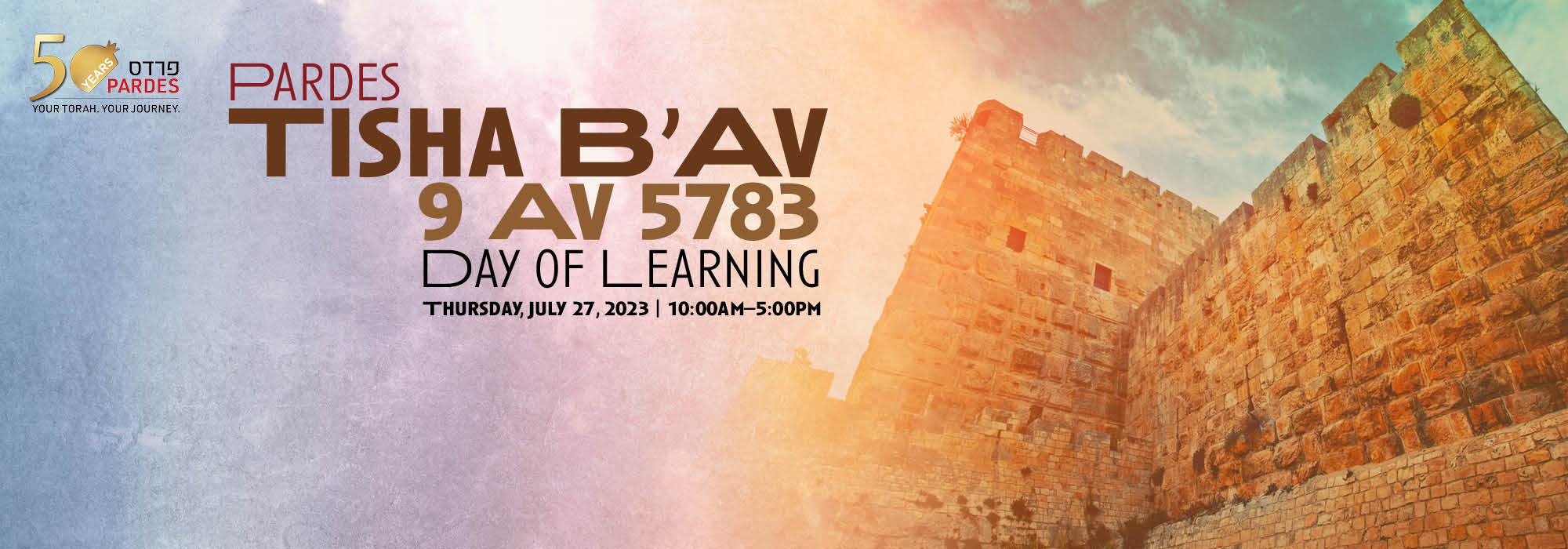
In observance of Tisha B’Av, each year, Pardes opens its door to its Jerusalem community inviting locals and visitors for a Day of Learning. Together, as we mourn, we study Eicha (Lamentations) and other texts related to the Destruction of the Temple and the tragedies that have befallen the Jewish people.
This year, the Pardes Tisha B’Av Day of Learning features six different lectures to choose from, a panel discussion, and a special film presentation.
The Pardes Tisha B’Av Day of Learning is in memory of our students who were murdered in terrorist attacks in Jerusalem.
Price:
Advanced Registration (Student): 35nis
Advanced Registration (General Admission): 50nis
At the Door: 75nis
9 Av 5783 Thursday, July 27, 202310:00 AM - 5:00 PM In-person at Pardes in Jerusalem
9 Av 5783
Thursday, July 27, 2023
10AM - 5PM
In-person at Pardes in Jerusalem
Your choice of three lectures:
Featuring Rav Rahel Berkovits
Students will encounter the literary power of the Talmud as we examine the story, as told by Tractate Gittin, of what led to the destruction of the Temple and the loss of Jerusalem as the political and cultural center. This text is filled with rabbinic self-reflection on what it means to be a leader and the importance of action even in difficult situations.
Featuring Judy Klitsner
We will examine the enigmatic story of the Akeda by pairing it with its conversational partner: the book of Job. Through the comparison– which will contain some intriguing reversals– we will address large philosophical/theological questions related to unjust suffering in the world.
Featuring Rabbi David Levin-Kruss
We will learn how the joyful holiday of Tu B’Av teaches us how to heal from the brokenness of 9 Av and shows us how to live forward-looking, joyful, dignified lives as individuals and as a nation.
Your choice of three lectures:
Featuring Professor Martin Lockshin
What is Eikhah (Lamentations) referring to when it writes (2:20) about a priest and a prophet killed in the Temple? We will study biblical texts and selections from commentaries, the Talmud, and the Tisha be’Av kinnot that address this question.
Featuring Rabbi Dr. Meesh Hammer-Kossoy
Seen as a whole, the colorful string of aggadot in Talmud Gittin that tell the story of the destruction give clear messages about the precariousness of life and how we should navigate it as leaders and as a Jewish people.
Featuring Gila Fine
What makes R. Assi escape from Babylon? Why is he so guilt-ridden once he arrives in Israel? And how do R. Yohanan’s therapeutic skills help him discover what he truly wants?
A psychological reading of the tale of R. Assi’s aliya through the Bavli and Yerushalmi, Maimonides and the Tosafot, Chrétien de Troyes and D.H. Lawrence, Freud and Jung, Alice Miller and H.N. Bialik.
Moderated by Rabbi Leon Morris
Panelists: Yiscah Smith, Adir Schwarz, Tamar Schwarzbard
Adir Schwarz is a Councilman at the Jerusalem municipality and the head of Hitorerut, the city’s largest Zionist political movement. Adir has been politically and socially active since the age of 16. He founded a soccer league for girls from all backgrounds, promoting gender equality and bridge building in Jerusalem. Adir has a BA in Political Science and Business Administration, and an MA in Public Policy, both from Hebrew U. Adir is a consultant for NPO’s and a lecturer at the Ono academic college.
Tamar Schwarzbard is Head of New Media at the Israel Ministry of Foreign Affairs. In her role, Tamar manages the State of Israel’s digital channels, sharing Israel’s story with millions around the world.
Tamar has a B.A in history from Yeshiva University and a Masters in Communications and Journalism from the Hebrew University in Jerusalem. She moved to Israel from New York City in 2013.
Yiscah Smith is a spiritual activist, educator, mentor, and meditation guide, who addresses the spiritual practice of encountering the Divine spark within and beyond.
Yiscah teaches Jewish contemplative practice and spiritual texts at the Pardes Institute of Jewish Studies and at Applied Jewish Spirituality. She has also founded and directs Conscious Community Nachlaot, an organization in Jerusalem that hosts Shabbat in-person spiritual gatherings, virtual guided meditation sits, and spiritual text classes. In addition, Yiscah works with individuals in her private spiritual mentoring practice. She has earned a reputation as a sought-after and inspiring international public speaker.
We will be watching the Maa’eh film “Eicha,” facilitated by Marc Kaye.
A multiple prizewinner and directed by “Srugim” creator Laizy Shapira, “Eicha” is the story of religious girl whose unusual name, Eicha, (the Hebrew title of the Biblical scroll of Lamentations) causes her angst and embarrassment. On reaching her 18th birthday, which is also the fast of Tisha B’Av, Eicha decides to formally change her name to try and establish a new identity. But the process turns out to be more complicated than she expected.
Pardes will be holding a memorial service for our students who were murdered in terrorism attacks.
Marla Bennett ז”ל
Ben Blutstein ז”ל
Sara Duker ז”ל
Matt Eisenfeld ז”ל
Mincha will be held after the memorial service.